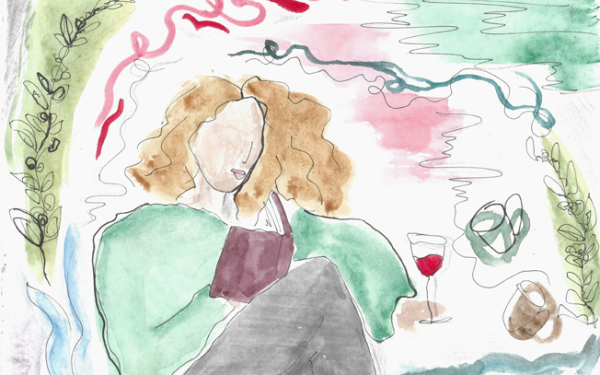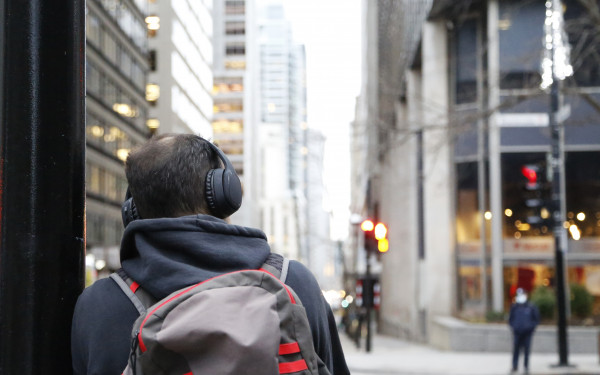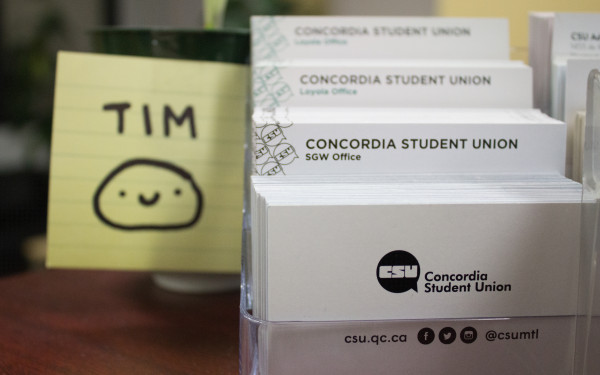The number of self-reported COVID-19 cases on campus has now risen to 53
Concerns about inadequate social distancing in classrooms were voiced by students in a CSU survey on campus saftey. Courtesy Concordia Student Union
What does this mean for the safety of Concordia’s community?
On Sept. 23, Concordia sent an email to its public citing 22 self-reported cases of COVID-19 on campus since its return to in-person learning.
The email contained no other details about these cases, but reassured Concordians that “there is no evidence of on-campus transmission” because its “Return-to-Campus plan has had an impact.”
As of this reporting, the university says the number of self-reported positive cases on campus has risen to 53; 50 were students, and 3 were non-faculty staff. Pietro Gasparrini, director of Concordia’s Environmental Health and Safety (EHS), and Wael Badawy, Occupational Health and Infection Control Advisor at EHS, told The Link that the university has been conducting its own contact tracing since summer of 2020. Badawy said thorough interviews are conducted with anyone who self-reports a positive COVID-19 test, and detailed information is gathered.
“Yes, we are asking [these] questions, we are making sure that we are covering all their steps,” Badawy said. “We ask questions like: When did you arrive on campus? Where did you go? Who did you meet? Did you go to the library? Did you go to the common rooms? Did you have lunch with someone? When did you leave? Did you meet anyone from Concordia outside of campus?”
These protocols allow EHS to notify Concordians if they’ve been exposed to the virus. While EHS has access to more detailed context of self-reported COVID-19 cases on campus, it did not release any further information to The Link. Gasparrini said the data isn’t definitive, and they didn’t want to cause panic.
“There hasn’t been a pattern, and we haven’t identified any trends,” Gasparrini said. “[For example], if the library was less safe, our obligation would be to tell the administration, ‘We have a problem in the library.’ We haven’t had any situations where we’ve had to intervene more than what we’ve established.”
“When sharing numbers, especially low numbers, we want to be cautious of not giving a false sense of security to our community as the pandemic is still ongoing” — Vannina Maestracci
How do students feel about these safety measures?
On Oct. 1, the Concordia Student Union launched a survey that aimed to gauge whether students felt safe and comfortable with return to campus measures. Though the survey closed Oct. 28, the full report won’t be available for another two weeks. The CSU did release a preliminary report based on a data set of around 150 participants which was presented in a senate meeting to administrators in early October.
Preliminary data from the survey revealed that only 36 per cent of students said they feel “completely safe” on campus. That left 64 per cent of students indicating that they felt either somewhat safe or not safe at all. Of students surveyed, 81 per cent said they had at least one class in-person, and 57 per cent said that social distancing wasn’t being observed in their in-person classes. Overall, 41 per cent of students feel mostly positive about the semester.
The CSU’s report of the survey concluded that “The vast majority of students do not feel fully safe on campus, even though many are happy about learning in-person again.”
While many students are discontent with the university’s health measures, some feel that campus restrictions are too stringent. Stella Vu, a student mentor who works on the Welcome Crew at Concordia’s Student Success Center, said she’s heard students lament the lack of spaces to eat, worrying that the winter will severely limit possibilities of staying indoors on campus for meals. Vu also said that those who frequent libraries and other public indoor spaces say the mask measures are unforgiving. According to Vannina Maestracci, Concordia’s spokesperson, the university’s mask requirements go above and beyond the province’s suggested public health measures.
“[First year] students were really hoping for more in-person activities, and some were annoyed with the fact that we don’t have as many events as we used to,” Vu said.
Vu also said that when she does get questions about COVID, they are usually from international students who feel frustrated with what they feel has been a rushed return to campus and in-person attendance requirements. According to Daniela Beltran Jimenez, another student mentor, most of the students she has interacted with seldom ask about campus Covid protocols.
"I would say that I could get one or two questions about Covid every two weeks. That's not something students really reach out to us for,” Beltran Jimenez said. “Their concerns [in terms of Covid is] 'what if I miss a class because I'm sick.'"
What happens after a student tests positive?
In early September, M, a student who wishes to remain anonymous, developed a cough after a visit from an out of town friend. When their friend returned home, they also developed COVID symptoms, and took a test. The test was negative, which reassured M enough to attend in-person classes on the first day of school. M was asked to rest until their cough subsided, but eventually felt compelled to take a COVID test. Within a few days, M received a call from Quebec Public Health informing them of the positive result.
M followed Concordia’s guidelines by completing the COVID-19 self-evaluation on Moodle. They received a call from EHS shortly after, and said that many questions were asked about their day, their whereabouts, and whether social distancing and mask restrictions were observed in their classrooms. M told EHS that Quebec Public Health directed them to self-quarantine for eight days. EHS then offered to excuse them of any attendance requirements with their professors.
M said that throughout the whole process, EHS only directly contacted them once.
Shortly after, they received a template email announcement from EHS notifying students of a positive COVID-19 case reported in an unspecified in-person class. EHS did not follow up with M again after that, and no further resources were provided.
“I don’t remember [the school] offering help with groceries or those types of things,” M said. “I’m used to living alone, and I was okay with that. But I keep thinking that if I was a student who just moved to Montreal, who didn’t know anything and was trying to make new friends and living by yourself, it would’ve obviously been a bit tough.”
M said that they were able to take care of themselves, order groceries, and prepare their own meals. They credited their ability to be independent despite having Covid because their symptoms were mild since they’re fully vaccinated.
Despite the fact that M followed Concordia’s guidelines carefully, students’ accessibility to self-report is still lacking. When The Link called Quebec Public Health as indicated by the university’s guidelines, the recorded messages and directories did not provide an avenue to self-report.
In fact, the operator at Quebec Public Health’s phone line was confused as to why a student would call Quebec Public Health in the first place. The operator said the protocol was actually to get a test first, and that Quebec Public Health would only call the patient back if their test result turned out positive. They also said the responsibility to report a positive COVID case to schools would ultimately be on the patient.
“The reality is [Quebec Public Health’s] protocols have evolved over time. At one point we were told, ‘Don’t send anyone to testing, they have to call us first.’ Then two weeks later we’re told, ‘Send everyone to testing, don’t tell them to call us first,’” Gasparrini said. “The pandemic has really been a learning experience for Quebec Public Health too.”
Gasparrini and Badawy explained that even if there were positive COVID cases on campus, the university’s masking requirements meant the risk of on-campus transmission was low. But given the lack of vaccine mandates or verification, it’s still unclear as to how low-risk transmission is accurately determined.
Shortly after The Link’s interview with EHS, it was announced that the university had released a dashboard presenting the number of self-reported Covid cases on campus. While updated on a weekly basis, it provides limited data to contextualize these numbers.
“When sharing numbers, especially low numbers, we want to be cautious of not giving a false sense of security to our community as the pandemic is still ongoing,” Maestracci told The Link. “The safety of our community is a shared commitment: we need everyone’s engagement in maintaining the health and safety measures (wearing masks, disclosing their COVID status, etc.) on campus.”
“But now, [nobody’s] even mentioning the pandemic anymore. Now, we don’t have the surrounding narrative to help us understand why we as individuals are having such a hard time, which then makes most people feel like, ‘it must be me.” — Dr. Genevieve Painter
How can Concordia make students feel safer?
Dr. Genevieve Painter, an assistant professor at Concordia’s Simone de Beauvoir Institute, emphasized the role of communication in building a sense of community and trust between the university and its students.
“I have students who are struggling way more than they have at any other point [in the three to four years I’ve known them]. Part of the reason that it’s difficult is that before, it was like, ‘I feel really afraid, I’ve never had to go through anything like this before, this is a mass collective trauma, and everyone is saying so,’” Painter said. “But now, [nobody’s] even mentioning the pandemic anymore. Now, we don’t have the surrounding narrative to help us understand why we as individuals are having such a hard time, which then makes most people feel like, ‘it must be me.’”
“Which is not at all what’s happening. We are still in a pandemic,” Painter added.
What’s clear is that Concordians—students, faculty, staff, and administration—do not share a homogenous interpretation of pandemic safety on campus. Thus a genuine, collective feeling of safety still eludes the Concordia community.
Ultimately, Concordians and the administration are left to the whims of Quebec Public Health, the Quebec government, and a global pandemic that just hasn’t quit.




